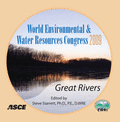A Level Spreader — Vegetated Buffer System for Urban Stormwater Management
Publication: World Environmental and Water Resources Congress 2009: Great Rivers
Abstract
Vegetated filter strips (VFS) have been used to remove pollutants from contributing agricultural watersheds for decades. In order to improve effectiveness of vegetated buffers, level spreaders have been employed to distribute flow evenly across the length of the upstream end of the buffer. In North Carolina, level spreader- VFS systems are now gaining acceptance as a stormwater BMP for urbanized watersheds, as it promotes infiltration and reduces impervious surfaces, two tenets of Low Impact Development. A field study of four level spreader — vegetated filter strip systems was conducted at two urban watersheds in Louisburg and Apex, NC. At each site, stormwater was routed proportionately over two 13 ft long level spreaders, one draining to a 25 ft wide grassed buffer, the other to a 50 ft wide, half grassed, half forested buffer. Flow rates and flow volumes were measured at the inlet and outlets of the system. Composite, flow-weighted water quality samples were collected at the inlet and outlet of the system and analyzed for TKN, NO3+NO2, TN, NH3 TP, Orthophosphate, and TSS. The buffers promoted infiltration, which resulted in a substantial decrease in flow volume and peak flow rate between the inlet and outlet of the system. To date, 46 storm events have been monitored for hydrology in Louisburg, NC. Flow volume was reduced by an average of 83% and 80% for the 25 ft and 50 ft wide buffers, respectively. These buffers also reduced peak flow rate by an average of 86% and 83%, respectively. These results show that a level spreader — vegetated filter strip system can effectively reduce the hydrologic impacts of impervious surfaces. Water quality monitoring has been ongoing since March, 2008, with 19 and 20 storms monitored for Apex and Louisburg, respectively. Reductions in event mean concentrations for all buffer treatments occurred for TKN, TN, and TSS, while the other pollutants studied had mixed results. Because of the large reduction in volume due to infiltration, these BMPs provide a large reduction in mass of pollutants. The median percent mass removal for the Louisburg buffers was greater than 74% for all but one water quality constituent studied. A level spreader is relatively (1) easy to install, (2) inexpensive, and (3) requires little maintenance. Carefully selected and designed level spreader — vegetated buffer systems can be an effective method of controlling stormwater flow and its associated pollutants in small urban watersheds.
Get full access to this article
View all available purchase options and get full access to this chapter.
Information & Authors
Information
Published In
Copyright
© 2009 American Society of Civil Engineers.
History
Published online: Apr 26, 2012
ASCE Technical Topics:
Authors
Metrics & Citations
Metrics
Citations
Download citation
If you have the appropriate software installed, you can download article citation data to the citation manager of your choice. Simply select your manager software from the list below and click Download.
